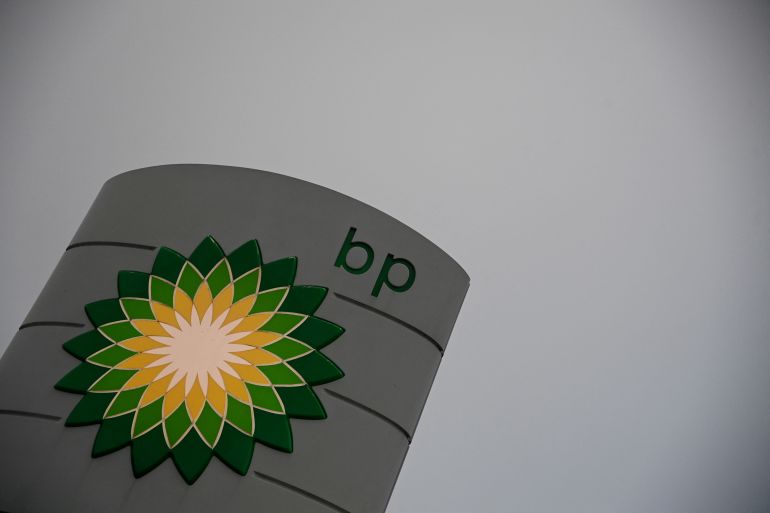Western companies in Russia’s oil and gas sector
Some facts about exposure of Western oil and gas companies to Russia.

International energy giant BP has opted to leave Russia after Western countries imposed severe sanctions on its companies and individuals following Moscow’s military attack on Ukraine.
BP, the biggest foreign investor in Russia, said it was abandoning its stake in the state oil company Rosneft at a cost of up to $25bn, shrinking its oil and gas reserves in half. Shell followed suit, saying it would divest of its exposure as well.
Keep reading
list of 4 itemsIOC calls for ban on Russian athletes amid Ukraine invasion
US Supreme Court weighs EPA’s authority to limit carbon emissions
Russian rouble plunges to record low amid outrage over Ukraine
The following are some facts about the exposure of Western oil and gas companies to Russia, which calls its actions in Ukraine a “special operation”:
BP
The British oil company has a 19.75 percent stake in Rosneft, headed by Igor Sechin, a longstanding ally of President Vladimir Putin. Rosneft accounted for a third of BP’s oil and gas output in 2021.
BASF
The German chemicals maker BASF co-owns Wintershall Dea – one of the financial backers of the suspended Nord Stream 2 gas pipeline – with Russian billionaire Mikhail Fridman’s LetterOne investor group. BASF also says it generates 1 percent of group sales from Russia.
Wintershall Dea and Gazprom jointly work at the Achimov Development gas-producing project.
CHEVRON
Chevron has a 15 percent stake in the Caspian Pipeline Consortium (CPC), a pipeline that runs from Kazakhstan to a Russian Black Sea terminal used for Chevron to export its crude. It also operates other subsidiaries that partner with Russian companies.
ENGIE
The French gas utility is one of five co-financiers of Gazprom’s Nord Stream 2 and has a stake in Nord Stream 1, an operating pipeline, along with Wintershall Dea and Gasunie.
ENI
The Italian company and Gazprom each have a 50 percent stake in the Blue Stream gas pipeline to Turkey.
EQUINOR
The energy group EQNR, which is majority-owned by the Norwegian state, said on Monday it will start divesting its joint ventures in Russia. It has minority stakes in three Russian oilfields.
Norway’s sovereign wealth fund, the world’s largest, will also divest its Russian assets, worth about 25 billion Norwegian crowns ($2.80bn).
EXXONMOBIL
The international oil company’s key asset in Russia is the Sakhalin-1 oil and gas producing project in the Pacific. ExxonMobil also markets petrochemical products in Russia that are used by local industries, according to its website.
An ExxonMobil affiliate has a 7.5 percent interest in the Caspian Pipeline Consortium (CPC), which exports oil from Kazakhstan via the Russian Black Sea port of Novorossiisk.
The company exited several joint ventures in Russia following sanctions imposed after Moscow annexed Crimea in 2014.
HALLIBURTON
Halliburton’s Eurasia unit operates in Russia and Ukraine. The company warned in February as tensions rose that its ability to engage in certain future projects in Russia or work with certain Russian customers depended on whether its involvement would be restricted as a result of United States or European Union sanctions laws.
OMV
The oil and gas company OMV is one of the five financial backers of Nord Stream 2 and is Austria’s main importer of Russian gas. It has a 24.99 percent stake in the Russian gas field Yuzhno-Russkoye.
SHELL
The Anglo-Dutch oil company is one of the biggest direct foreign investors in the Russian economy. It owns 27.5 percent of the Sakhalin-2 liquefied natural gas project, which has an annual capacity of 11 million tonnes and is operated by Gazprom. It is one of the five co-financiers of Nord Stream 2.
Shell also has interests in the Salym Petroleum oil project with Gazprom Neft and a venture for hydrocarbon development at Gydan Arctic peninsular. On Monday, Shell said it planned on leaving its Russian partnerships.
TOTALENERGIES
The French company holds a 19.4 percent stake in Novatek, Russia’s largest producer of liquefied natural gas (LNG). It has a 20 percent stake in the Yamal LNG project as well as a 10 percent interest in Arctic LNG 2, which is scheduled to start production next year.
The company also holds a 49 percent stake in the Terneftegas joint venture, which develops the Termokarstovoye onshore gas and condensate, and a 20 percent interest in the onshore Kharyaga oil field, its website shows. It has acquired 10 percent in LNG transhipment hubs in Murmansk and Kamchatka.
UNIPER
The German utility has a $1bn exposure to Nord Stream 2, along with five power plants in Russia with a combined capacity of 11.2 gigawatts, providing about 5 percent of Russia’s total energy needs.
Uniper and its controlling shareholder Fortum together own 12 power plants in Russia and employ 7,000 people there.
(Reporting by Reuters in Moscow; Editing by Emelia Sithole-Matarise and Alistair Bell)